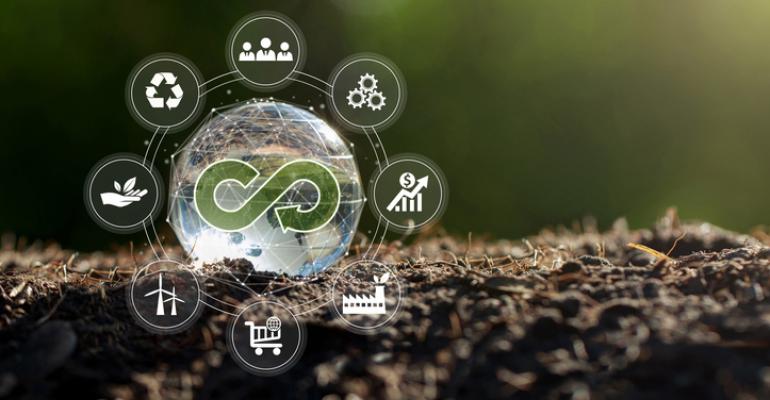When it comes to sustainability, how much do you ask of your meeting and event producers? And how do you measure the progress and effectiveness of those efforts?
Informa, the London-based business intelligence and exhibitions company (and parent company of MeetingsNet) has developed what it calls the Fundamentals. Launched in 2019 and expanded in 2023, the Fundamentals set expectations for sustainability across all areas—from waste management and procurement to accessibility and positive impacts for the community. They help organizers know where they stand with their sustainability efforts and create a record to build on year over year.
Conference managers complete a Fundamentals workbook for each major Informa event. They are asked to note what efforts were made in previous years, the plan for the current event, and the actual results. The workbook is also where they log specific event data on energy use, waste, and other sustainability metrics.
The Fundamentals workbook provides consistent guideposts for Informa organizers around the world, and could be an inspiration for any organization as it guides planners toward a continuous-improvement process for event sustainability.
Informa’s 16 Fundamentals are below. Those added as part of “Fundamentals 2.0” in 2023 are marked with an asterisk.
Purpose
1. For the content of the event to support the sustainable development of the industry.
Examples include sustainability-related education sessions, a sustainability awards program, diversity of speakers, and programs or conference-cost structures that support diversity and equity or new talent development.
2. For the event to have a purposeful partnership with a not-for-profit organization.
The not-for-profit group should have a positive impact on the event’s market sector and be linked to the sustainable development of the sector. One example of a partnership is providing space for the not-for-profit group to exhibit at an event.
**3. For the event brand to have successfully embedded “Sustainability Inside,” helping customers accelerate the sustainable development in their specialty market.
Building upon efforts to add sustainability into event content in Fundamentals 1 and 2, the goal is for the presence of sustainability to be significant, ongoing, noticeable, relevant, and influential.
Stakeholder Engagement
4. For there to be six substantial sustainability communications.
These communications can include the event website, social media, exhibitor communications, post-show survey, and so on. Examples could be communications about on-site accessibility and about your Code of Conduct.
5. For the event team to be engaged with sustainability, and for sustainability to be a part of event decisions.
Event-team members should be briefed every six months on the sustainability features of the event and its future plans and objectives.
Carbon and Waste
6. For all lighting specified by Informa to be energy efficient LEDs, and for the venue’s lights and AC to be used efficiently.
In addition to using LEDs, and the venue must be engaged with the goal of energy efficiency around heating, cooling, and lighting.
7. For the event to have minimal to no waste generation from areas of the show built by Informa.
Areas such as registration and shell-scheme exhibits should be structurally waste-free and the carpet must be reused or recycled after the event.
**8. For all exhibitor stands to have reached at least a bronze level in the Better Stands program.
This means all stand structures are designed as a reusable system.
**9. For there to be at least two initiatives to optimize the impact of attendee travel, and relevant data on attendee travel and flight savings to be collected.
Procurement
10. For three of the printing and promotional items procured for the event to have increased efficiency and to have enhanced sustainability credentials.
This includes moving to more sustainable materials, such as lanyards made of recycled plastic; reusing items where possible; and using digital options.
11. For there to be at least three ways in which the sustainability of the food and beverage at the event has been enhanced.
This could include reducing food waste, minimizing food packaging, increasing vegetarian options, and sourcing fair ingredients. As part of considering the sustainability of your catering, did your event provide for special food requirements including halal, kosher and vegetarian?
Local Community and Well Being
12. For the event to have at least two initiatives that support the local community around the event venue.
This could mean proactively choosing local suppliers, providing discounted tickets to locals, creating a legacy project, or supporting a charity focused on the community.
13. For the event to have at least three initiatives that enhance the wellbeing, equality, accessibility, and respect for all.
This can include an exhibitor code of conduct, networking events that promote diversity, or event accessibility initiatives that ensure access for attendees who use wheelchairs or who are visually impaired. Has the event taken the necessary steps to prevent anything appearing to be sexist or culturally insensitive? Was there a prayer room provided at the event? Was there a lactation suite provided at the event for new parents?
**14. For the event to have successfully implemented and measured the impact of at least one significant initiative to “connect the disconnected,” removing barriers to its networks and knowledge.
Those barriers relate to those with financial constraints or involve other disenfranchised audiences.
Governance
15. For the event to successfully implement the Informa Event Safety Operating Model.
This refers to Informa’s nine-step approach to integrating best practices for health and safety into an event.
16. For event-sustainability data to be submitted within six weeks of the event.
The Fundamentals are submitted to Informa’s sustainability team, reviewed, and graded.





